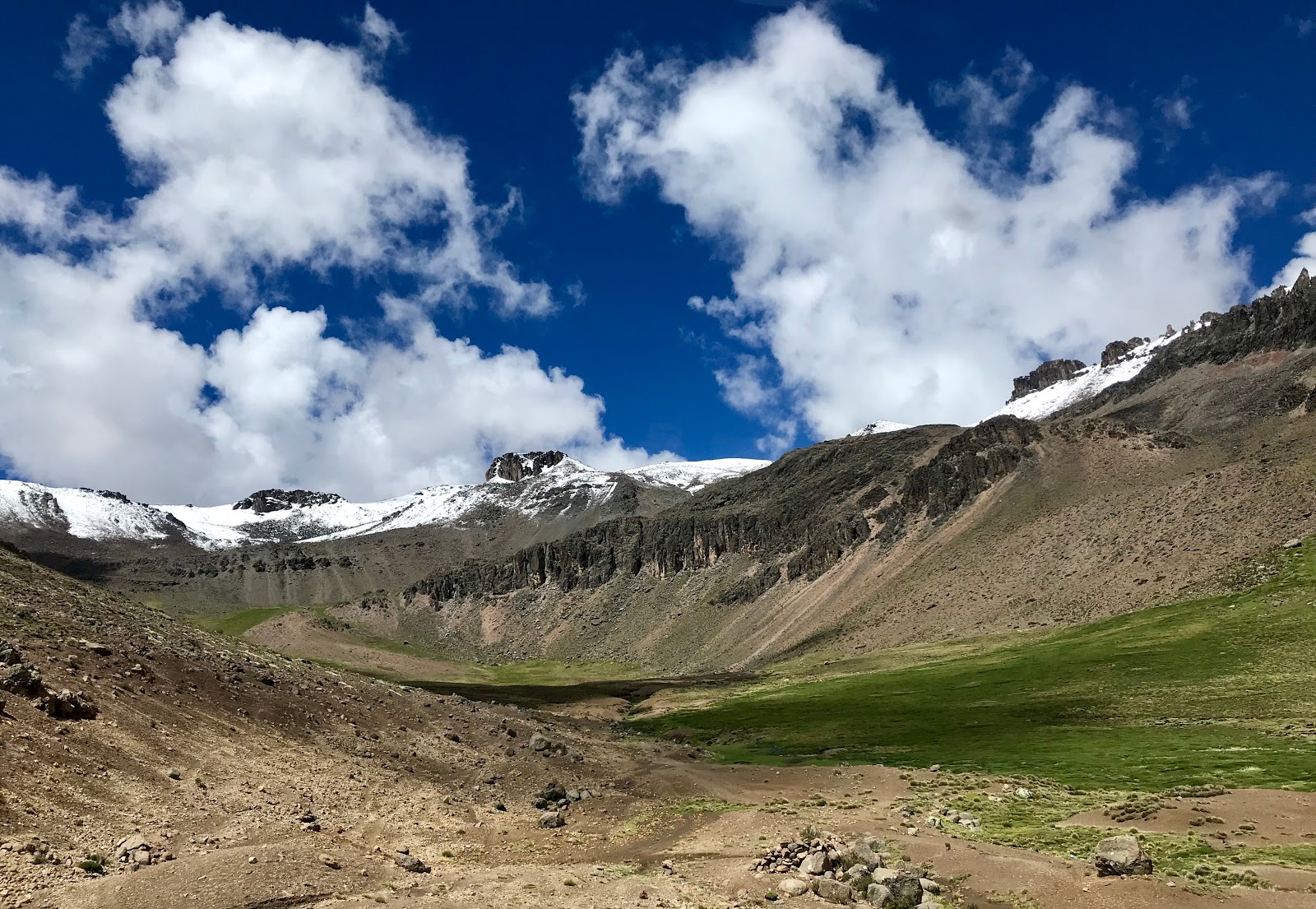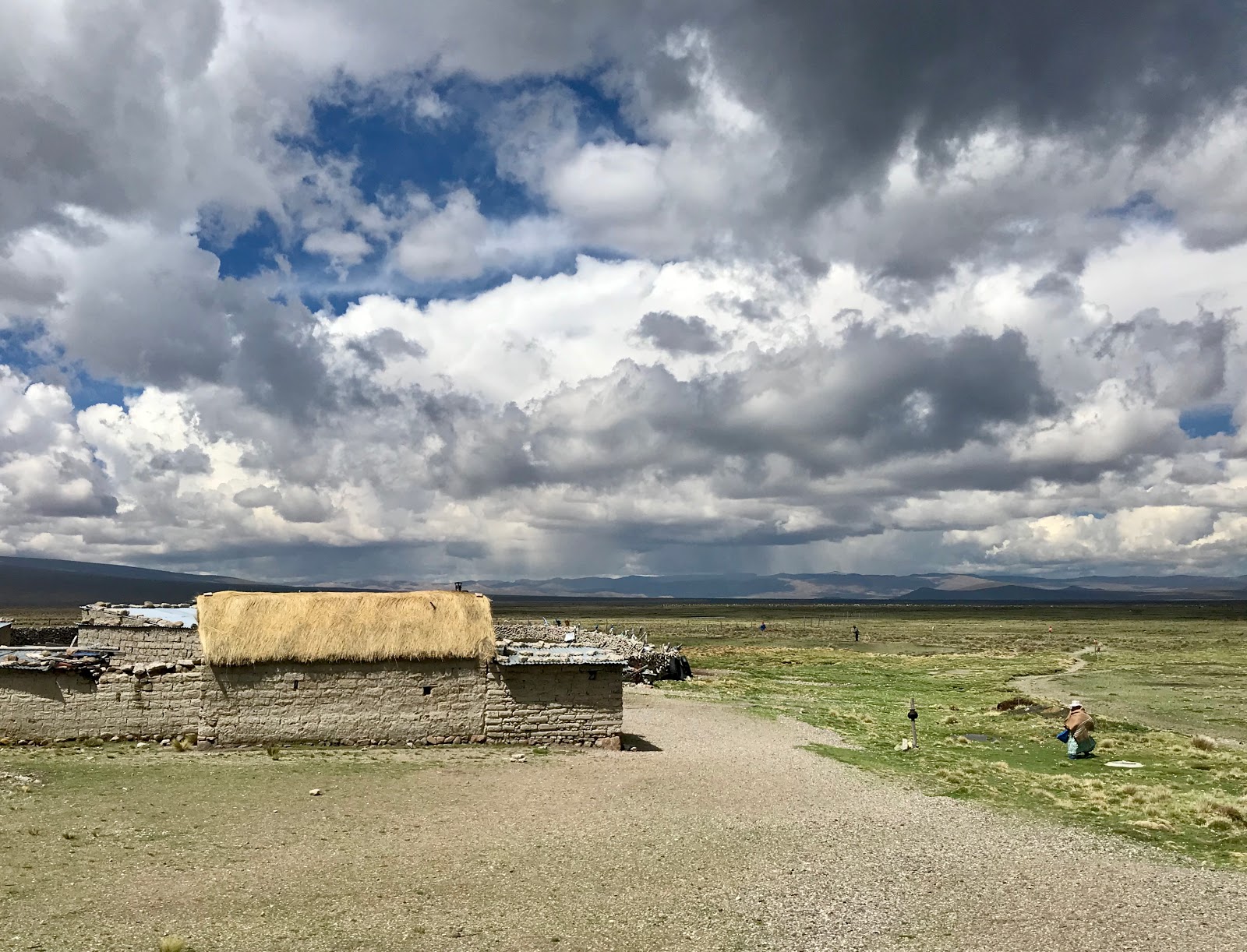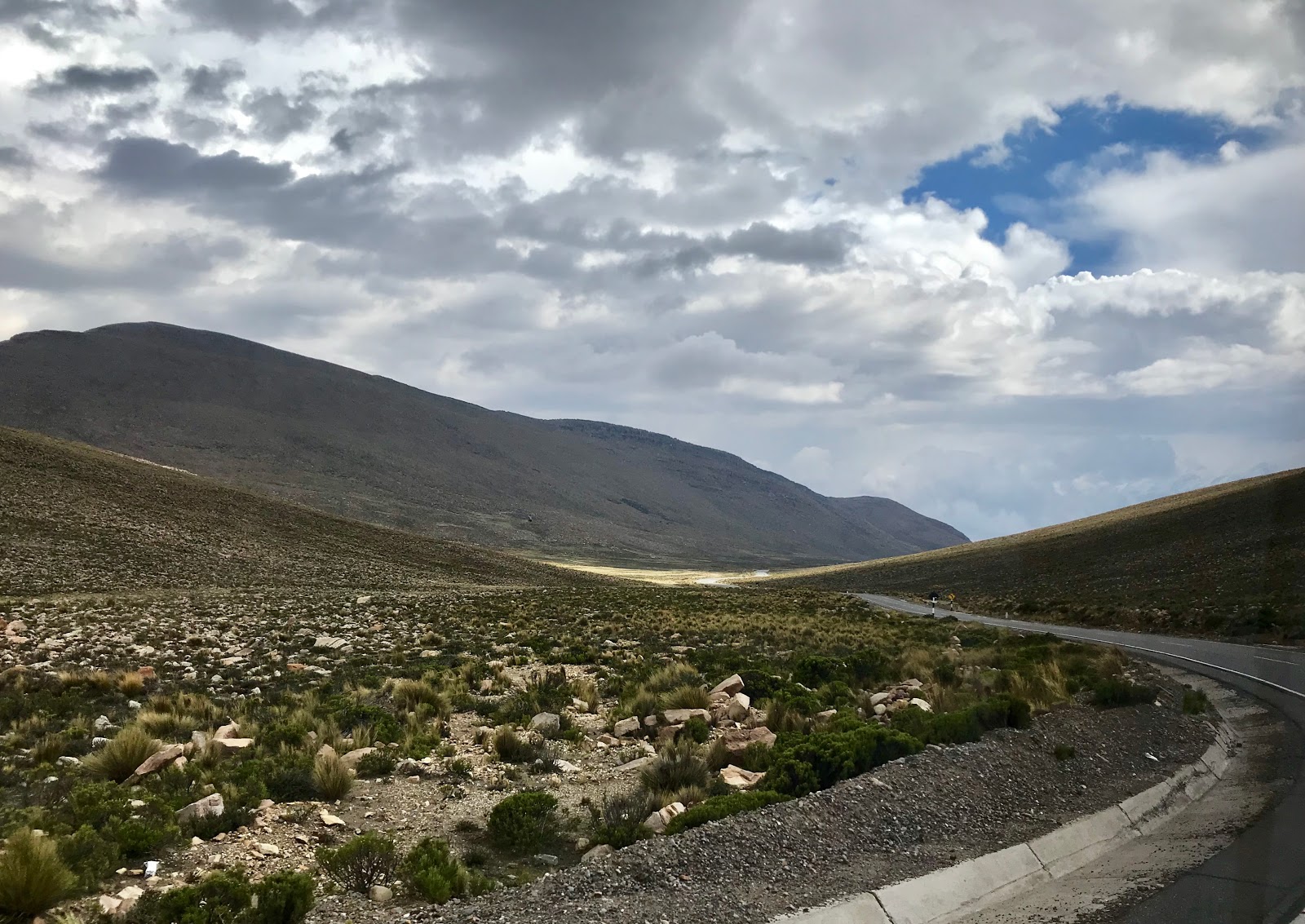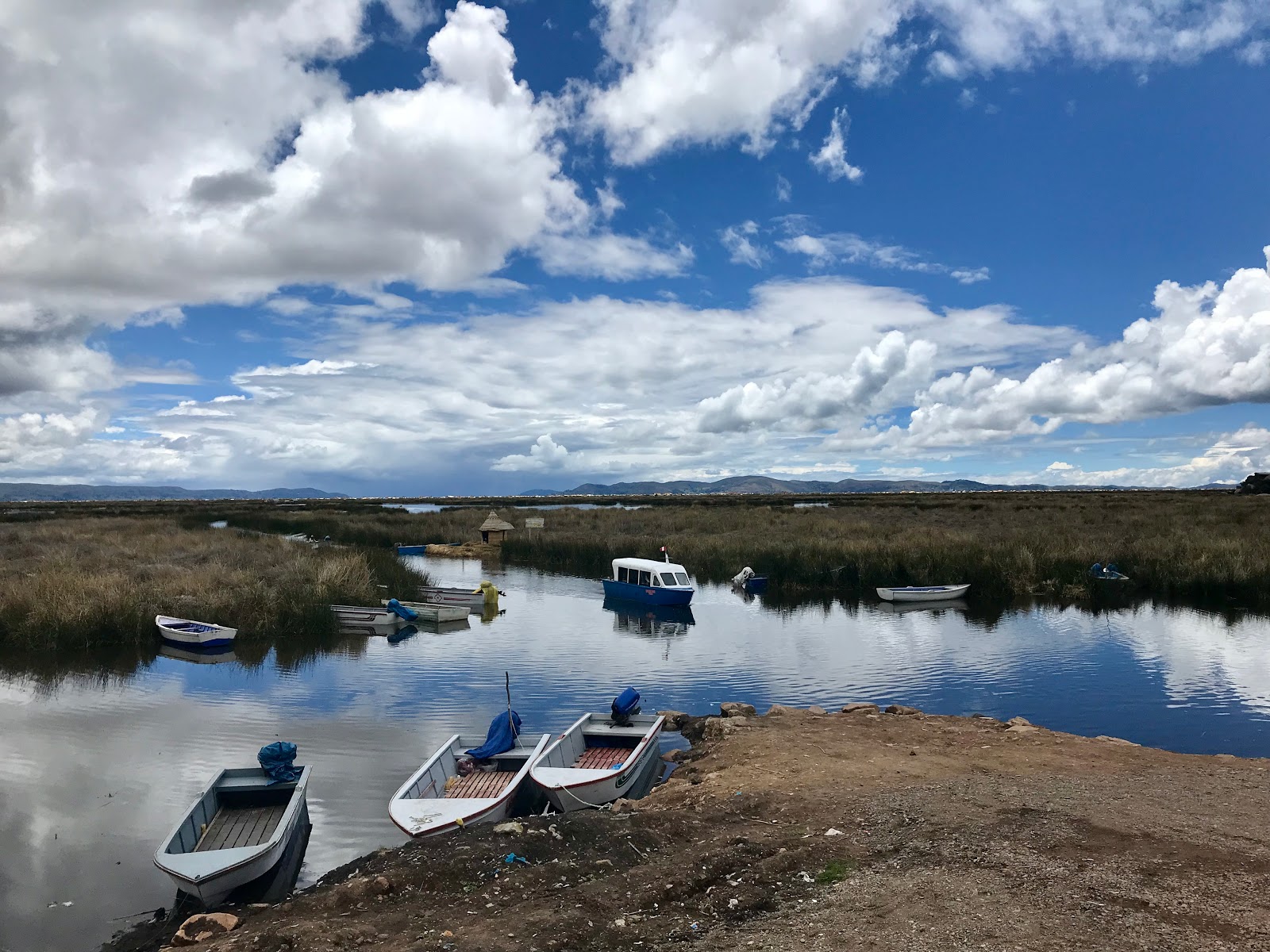In broken Spanish, we ask Victoria, "Can nina nadar?"
"No." She replies, "Must stay away from agua." Referring to her two daughters, aged six and two.
"No." She replies, "Must stay away from agua." Referring to her two daughters, aged six and two.
We ask, because their home is a floating island of reeds on Lake Titicaca. It appears very easy for us to accidentally step too close to the edge, or in a weak spot and slip through.
Over the two days we spend with Ruben, Victoria and their three children, we fell in love with their kindness, humility, openness and generosity.
Our journey from Chivay to Puno took us six hours through the mountains and stopping at various sites for vistas and coca tea. We arrived late into Puno, so didnt see much, in the morning, Ruben had organised for a taxi to pick us up to drive us 15 minutes to the Uros Port, where he would collect us by boat.
We climbed aboard a small boat and he took us through the reeds along the coast of the lake, passed a small open patch of water to another group of reeds and structures that were resting on top of the small islands.
Ruben admitted that the majority of these houses are now here just for the tourists. Larger boats bring groups of 20 to 30 out from Puno for day trips. We could see these boats pulling alongside some of the islands. People hopping off and being greeted by locals wanting to educate them on their history and then sell some gifts.
For us, we went past these homes, across an open patch of water to huts on the other side. The boat slid into some reeds and Ruben asked us to hop off.
In front of us were a mixture of small huts, built with light materials. Ply wood, aluminium, polystyrene and some reeds for decoration. Ruben led us to one that would be our room for the night.
The other huts were for his brother and sister. One hut held the banos, and a larger one was the kitchen and eating area. He was building another room as a third guests room. We could see paint brushes and some building materials laying outside on the reeds.
The reeds underfoot were soft. In places you could even see some water rise up around your foot. The main walking areas had plenty of firmness. But if you stepped too far either side you could sink into the top of the lake.
We settled our belongings in our room, then sat under some shade on chairs and let the hours drift by.
In the afternoon we met another guest, Jenny, who was travelling from the UK for a few months.
In the afternoon we met another guest, Jenny, who was travelling from the UK for a few months.
Though our favourite moment was when we met Ruben's wife, Victoria and their children. They had two small girls, six and two, and a boy only four months.
We spent the afternoon playing with the girls, inviting them to paint and generally mucking about.
Ruben headed off on a four hour job to collect some more reeds. Every 15 days they needed to relay more reeds around their small island to keep it stable.
At times when a boat passed by, we could feel the gentle sway of the island. Ruben informed us that the reeds were a metre in depth, then a further two metres were the floating roots of the reeds. Below that was water.
A few years ago when a storm struck, the wind blew all of the small islands a kilometre along the lake. The next day everyone had to use their boats to push the islands back into place and re-anchor them.
There are three different groups of poeple that lived on Lake Titicaca. Ruben is from the Murata group, while Victoria is Chipaya. The language is completely different, to understand each other they both speak Spanish. Though they are teaching their daughters all three languages. Ruben and Victoria were also able to speak English well enough for us to learn from them.
In the early evening, Ruben returned with a large pile of reeds on his small boat. We then helped him lay the new reeds down across the dock area. This took over an hour and required a lot of twisting and turning with large arm fulls of reeds. Ruben would direct us where to go and how to lay them down. The first layer facing one way, the second switched around but coming back on top again. Higher and higher we built the new dock area, then with remaining reeds with placed them on the central walkways between the huts.
It was a remarkable moment, under the moonlight, looking across the lake as the city lights of Puno shone. Completing the regular chore of maintaining the island and spreading the reeds. It was physical work and for a brief moment Ruben paused, he looked to his family sitting in the dark. I asked him if we had finished.
"No, I am just tired." He said, "This is my life, I do this for my family."
"No, I am just tired." He said, "This is my life, I do this for my family."
When the boat was finished, we made our way into the kitchen and together, under Victoria's direction, we prepared dinner.
At times we certainly got it wrong. We would dice, when she asked for sliced. We would laugh and know that it doesn't matter. Victoria took a loy of care and pride in her meals and each one was incredible.
We were pleased to help and made sure to wash all of the dishes. We feel she appreciated this the most. We sat and ate our meals together. Ours had a little more food on them, while they had something simpler, fish with rice.
So we made sure to share our best bits with the kids.
The night was a cozy sleep, under several heavy layers of Alpaca blankets. We felt adjusted to the 3,800m altitude. A long day helped us sleep from 9pm through to 7am.
In the morning, after Ruben headed onto mainland to refill the gas bottles, we started breakfast. Large omelettes and coffee was perfect.
Ruben then provided us a journey on the boat around the area. Explaining more about the history of his family, their life and the challenges.
Ruben's Mother and Father also lived on an island, though further back into the reeds. Away from the touristy area.
Every five years they would move the huts that sat on top of the reeds. They would replace with new reeds and then reposition the huts back on top. A manual job that involved lifting and rolling the huts across long wooden logs.
In the Summer months they only had to replace reeds on the walkways once a month, but in the wet season it was twice a month. Solar electricity is recent but provides a lot of benefits. You can hear families playing music during the day and often parties were held at night in front of a television.
There was a kindergarten and primary school in the islands. But for secondary, the kids would travel to the mainland, at Puno. They had a small hospital but for anything serious or for childbirth, they would go to the hospital on Puno.
A number of years ago the Government put a restriction on how many reeds they could harvest for their island. All the communities went into town to protest and eventually it was lifted. While they are allowed to collect as much as they want, the communities had a process for where to collect and to rotate around different areas each year to ensure re-growth occured.
During our stay, we noticed small regular habits. A larger boat came by and collected the garbage for them.
Another general stores boat dropped by and Ruben bought some toilet paper from him.
Another general stores boat dropped by and Ruben bought some toilet paper from him.
Prior to lunch on the first day we saw Ruben head off on the boat and came back within a few minutes with a bag of fish. They did have a small pond in the middle of their island that held several trout in a large net. Though he said he buys the fish that they give us from a friend.
Half way through our breakfast preparation, Victoria said she needed to rush off on the boat. She was gone only ten minutes as we kept an eye on the stove food. She had run out of eggs and went to a friends to buy some more.
We asked about the sewerage and waste water. Many years ago they let the waste filter down through the roots of the reeds. They acted as a filtering system. They also used to drink water directly from the lake, however in recent years the homes now have a water tank with a filter attached to it. The same has now applied to the sewerage, it now goes through a filter system before being deposited deep in the reeds.
During the dry season, while it is busy with tourists, they are at risk with fires. Ruben showed us a small island that had three of its huts burn down.
The community was growing. Where we stayed, there were 150 families. There were two other smaller communities that were more remote on Lake Titicaca.
At times when Ruben was describing their life, he would pause, then add, "It is peaceful."
It seemed they enjoyed the remote nature of their life, the minimal resources required and the regular task of maintaining their home.
The experience we had with Ruben and his family felt genuine. They were happy to share their story and we were privileged to participate in their life.
It was unique, evolving, and a true home.
We gave giant hugs and a few cheeky lollies which were eagerly unwrapped.
We boarded the boat and rode back into shore. Though only gone one night, it felt a little strange returning to the mainland folk.
We boarded the boat and rode back into shore. Though only gone one night, it felt a little strange returning to the mainland folk.
At the dock, the eldest daughter was allowed to buy an icecream from a local seller, before climbing back onboard the boat and heading home.
We made sure to remind Ruben that he had a beautiful family and a lovely home.
An incredible experience to us.
A home on Lake Titicaca.
An incredible experience to us.
A home on Lake Titicaca.




































Oh wow!! For the first time reading this blog i had to stop, and go see the pictures before reading on, just to see what you were talking about, what an amazing place.
ReplyDeleteYou two really are beautiful people, a caring and helpful couple. I'm sure that the family thought you were just as genuine and that it was special to have met you xx
This comment has been removed by the author.
ReplyDeleteWhat an amazing experience and wonderful family.... does the island rock in a storm?
ReplyDeleteYes, I wondered about heavy weather and effect of wind, too.
ReplyDelete